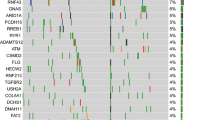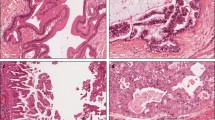Abstract
The vast majority of tumors of the pancreas are ductal adenocarcinomas. This cancer type has an extremely poor prognosis and in many Western countries, it represents the fifth leading cause of cancer-related death. Pancreatic ductal adenocarcinomas exhibit the highest incidence of activating KRAS (Ki-Ras) mutations observed in any human cancer. It was therefore of interest to examine how this pattern would relate to mutations in the BRAF and EGFR genes, which are involved in the same signaling pathway as KRAS. We screened a series of 43 formalin-fixed, paraffin-embedded ductal adenocarcinomas of the pancreas. When DNA was extracted from whole tissue sections, KRAS codon 12 mutations were detected in 67% of the tumors. When cancerous ducts were isolated by laser-assisted microdissection, 91% were positive for KRAS mutations. Although it did not reach statistical significance, there was a trend in our material that survival after diagnosis varied according to KRAS mutation subtype, GTT-positive patients having the best prognosis. No alterations in BRAF exons 11 and 15 or in EGFR exons 18–21 were detected in KRAS-positive or KRAS-negative cases. We therefore conclude that the BRAF and EGFR mutations commonly seen in a variety of human cancers are generally absent from pancreatic ductal adenocarcinomas. Apparently, these tumors depend on no more than one genetic hit in the EGFR-RAS-RAF signaling pathway.




Similar content being viewed by others
References
Akslen LA, Angelini S, Straume O, Bachmann IM, Molven A, Hemminki K, Kumar R (2005) BRAF and NRAS mutations are frequent in nodular melanoma but are not associated with tumor cell proliferation or patient survival. J Invest Dermatol 125:312–317
American Joint Committee on Cancer (1998) Cancer staging handbook, 5th edn. Lippincott Raven, Philadelphia
Andreyev HJ, Norman AR, Cunningham D, Oates J, Dix BR, Iacopetta BJ, Young J, Walsh T, Ward R, Hawkins N et al (2001) Kirsten ras mutations in patients with colorectal cancer: the ‘RASCAL II’ study. Br J Cancer 85:692–696
Banerjee SK, Makdisi WF, Weston AP, Campbell DR (1997) A two-step enriched-nested PCR technique enhances sensitivity for detection of codon 12 K-ras mutations in pancreatic adenocarcinoma. Pancreas 15:16–24
Bartsch DK (2003) Familial pancreatic cancer. Br J Surg 90:386–387
Blaker H, Helmchen B, Bonisch A, Aulmann S, Penzel R, Otto HF, Rieker RJ (2004) Mutational activation of the RAS-RAF-MAPK and the Wnt pathway in small intestinal adenocarcinomas. Scand J Gastroenterol 39:748–753
Calhoun ES, Jones JB, Ashfaq R, Adsay V, Baker SJ, Valentine V, Hempen PM, Hilgers W, Yeo CJ, Hruban RH et al (2003) BRAF and FBXW7 (CDC4, FBW7, AGO, SEL10) mutations in distinct subsets of pancreatic cancer: potential therapeutic targets. Am J Pathol 163:1255–1260
Cancer Registry of Norway (2005) Cancer in Norway 2002. Cancer Registry of Norway, Oslo
Carpelan-Holmstrom M, Nordling S, Pukkala E, Sankila R, Luttges J, Kloppel G, Haglund C (2005) Does anyone survive pancreatic ductal adenocarcinoma? A nationwide study re-evaluating the data of the Finnish Cancer Registry. Gut 54:385–387
Chan TL, Zhao W, Leung SY, Yuen ST (2003) BRAF and KRAS mutations in colorectal hyperplastic polyps and serrated adenomas. Cancer Res 63:4878–4881
Davies H, Bignell GR, Cox C, Stephens P, Edkins S, Clegg S, Teague J, Woffendin H, Garnett MJ, Bottomley W et al (2002) Mutations of the BRAF gene in human cancer. Nature 417:949–954
Domingo E, Espin E, Armengol M, Oliveira C, Pinto M, Duval A, Brennetot C, Seruca R, Hamelin R, Yamamoto H et al (2004) Activated BRAF targets proximal colon tumors with mismatch repair deficiency and MLH1 inactivation. Genes Chromosomes Cancer 39:138–142
Fukushima T, Suzuki S, Mashiko M, Ohtake T, Endo Y, Takebayashi Y, Sekikawa K, Hagiwara K, Takenoshita S (2003) BRAF mutations in papillary carcinomas of the thyroid. Oncogene 22:6455–6457
Goggins M, Offerhaus GJ, Hilgers W, Griffin CA, Shekher M, Tang D, Sohn TA, Yeo CJ, Kern SE, Hruban RH (1998) Pancreatic adenocarcinomas with DNA replication errors (RER+) are associated with wild-type K-ras and characteristic histopathology. Poor differentiation, a syncytial growth pattern, and pushing borders suggest RER+. Am J Pathol 152:1501–1507
Hruban RH, van Mansfeld AD, Offerhaus GJ, van Weering DH, Allison DC, Goodman SN, Kensler TW, Bose KK, Cameron JL, Bos JL (1993) K-ras oncogene activation in adenocarcinoma of the human pancreas. A study of 82 carcinomas using a combination of mutant-enriched polymerase chain reaction analysis and allele-specific oligonucleotide hybridization. Am J Pathol 143:545–554
Hruban RH, Goggins M, Parsons J, Kern SE (2000) Progression model for pancreatic cancer. Clin Cancer Res 6:2969–2972
International Agency for Research on Cancer (2000) Tumours of the digestive system. In: Hamilton SR, Aaltonen LA (eds) WHO classification of tumours. IARC Press, Lyon
Ishimura N, Yamasawa K, Karim Rumi MA, Kadowaki Y, Ishihara S, Amano Y, Nio Y, Higami T, Kinoshita Y (2003) BRAF and K-ras gene mutations in human pancreatic cancers. Cancer Lett 199:169–173
Jemal A, Murray T, Samuels A, Ghafoor A, Ward E, Thun MJ (2003) Cancer statistics, 2003. CA Cancer J Clin 53:5–26
Kawesha A, Ghaneh P, Andren-Sandberg A, Ograeid D, Skar R, Dawiskiba S, Evans JD, Campbell F, Lemoine N, Neoptolemos JP (2000) K-ras oncogene subtype mutations are associated with survival but not expression of p53, p16(INK4A), p21(WAF-1), cyclin D1, erbB-2 and erbB-3 in resected pancreatic ductal adenocarcinoma. Int J Cancer 89:469–474
Korc M, Chandrasekar B, Yamanaka Y, Friess H, Buchier M, Beger HG (1992) Overexpression of the epidermal growth factor receptor in human pancreatic cancer is associated with concomitant increases in the levels of epidermal growth factor and transforming growth factor alpha. J Clin Invest 90:1352–1360
Lee EJ, Choi C, Park CK, Maeng L, Lee JQ, Lee A, Kim K-M (2005) Tracing origin of serrated adenomas with BRAF and KRAS mutations. Virchows Arch 447:597–602
Li D, Xie K, Wolff R, Abbruzzese JL (2004) Pancreatic cancer. Lancet 363:1049–1057
Lohr M, Kloppel G, Maisonneuve P, Lowenfels AB, Luttges J (2005) Frequency of K-ras mutations in pancreatic intraductal neoplasias associated with pancreatic ductal adenocarcinoma and chronic pancreatitis: a meta-analysis. Neoplasia 7:17–23
Loukopoulos P, Kanetaka K, Takamura M, Shibata T, Sakamoto M, Hirohashi S (2004) Orthotopic transplantation models of pancreatic adenocarcinoma derived from cell lines and primary tumors and displaying varying metastatic activity. Pancreas 29:193–203
Lowenfels AB, Maisonneuve P (2004) Epidemiology and prevention of pancreatic cancer. Jpn J Clin Oncol 34:238–244
Luttges J, Schlehe B, Menke MA, Vogel I, Henne-Bruns D, Kloppel G (1999) The K-ras mutation pattern in pancreatic ductal adenocarcinoma usually is identical to that in associated normal, hyperplastic, and metaplastic ductal epithelium. Cancer 85:1703–1710
Lynch HT, Shaw TG, Lynch JF (2004) Inherited predisposition to cancer: a historical overview. Am J Med Genet C Semin Med Genet 129:5–22
Lynch TJ, Bell DW, Sordella R, Gurubhagavatula S, Okimoto RA, Brannigan BW, Harris PL, Haserlat SM, Supko JG, Haluska FG et al (2004) Activating mutations in the epidermal growth factor receptor underlying responsiveness of non-small-cell lung cancer to gefitinib. N Engl J Med 350:2129–2139
Maple JT, Smyrk TC, Boardman LA, Johnson RA, Thibodeau SN, Chari ST (2005) Defective DNA mismatch repair in long-term (> or =3 years) survivors with pancreatic cancer. Pancreatology 5:220–227
Miller CJ, Cheung M, Sharma A, Clarke L, Helm K, Mauger D, Robertson GP (2004) Method of mutation analysis may contribute to discrepancies in reports of (V599E)BRAF mutation frequencies in melanocytic neoplasms. J Invest Dermatol 123:990–992
Nagasaka T, Sasamoto H, Notohara K, Cullings HM, Takeda M, Kimura K, Kambara T, MacPhee DG, Young J, Leggett BA et al (2004) Colorectal cancer with mutation in BRAF, KRAS, and wild-type with respect to both oncogenes showing different patterns of DNA methylation. J Clin Oncol 22:4584–4594
Ogino S, Kawasaki T, Brahmandam M, Yan L, Cantor M, Namgyal C, Mino-Kenudson M, Lauwers GY, Loda M, Fuchs CS (2005) Sensitive sequencing method for KRAS mutation detection by pyrosequencing. J Mol Diagn 7:413–421
Paez JG, Janne PA, Lee JC, Tracy S, Greulich H, Gabriel S, Herman P, Kaye FJ, Lindeman N, Boggon TJ et al (2004) EGFR mutations in lung cancer: correlation with clinical response to gefitinib therapy. Science 304:1497–1500
Rajagopalan H, Bardelli A, Lengauer C, Kinzler KW, Vogelstein B, Velculescu VE (2002) Tumorigenesis: RAF/RAS oncogenes and mismatch-repair status. Nature 418:934
Ren YX, Xu GM, Li ZS, Song YG (2004) Detection of point mutation in K-ras oncogene at codon 12 in pancreatic diseases. World J Gastroenterol 10:881–884
Richter A, Niedergethmann M, Sturm JW, Lorenz D, Post S, Trede M (2003) Long-term results of partial pancreaticoduodenectomy for ductal adenocarcinoma of the pancreatic head: 25-year experience. World J Surg 27:324–329
Rozenblum E, Schutte M, Goggins M, Hahn SA, Panzer S, Zahurak M, Goodman SN, Sohn TA, Hruban RH, Yeo CJ et al (1997) Tumor-suppressive pathways in pancreatic carcinoma. Cancer Res 57:1731–1734
Saetta AA, Papanastasiou P, Michalopoulos NV, Gigelou F, Korkolopoulou P, Bei T, Patsouris E (2004) Mutational analysis of BRAF in gallbladder carcinomas in association with K-ras and p53 mutations and microsatellite instability. Virchows Arch 445:179–182
Samuels Y, Wang Z, Bardelli A, Silliman N, Ptak J, Szabo S, Yan H, Gazdar A, Powell SM, Riggins GJ et al (2004) High frequency of mutations of the PIK3CA gene in human cancers. Science 304:554
Schutte M, Hruban RH, Geradts J, Maynard R, Hilgers W, Rabindran SK, Moskaluk CA, Hahn SA, Schwarte-Waldhoff I, Schmiegel W et al (1997) Abrogation of the Rb/p16 tumor-suppressive pathway in virtually all pancreatic carcinomas. Cancer Res 57:3126–3130
Sessa F, Bonato M, Bisoni D, Ranzani GN, Capella C (1998) Ki-ras and p53 gene mutations in pancreatic ductal carcinoma: a relationship with tumor phenotype and survival. Eur J Histochem 42(Spec Issue):67–76
Sommerer F, Vieth M, Markwarth A, Rohrich K, Vomschloss S, May A, Ell C, Stolte M, Hengge UR, Wittekind C et al (2004) Mutations of BRAF and KRAS2 in the development of Barrett’s adenocarcinoma. Oncogene 23:554–558
Song MM, Nio Y, Dong M, Tamura K, Furuse K, Tian YL, He SG, Shen K (2000) Comparison of K-ras point mutations at codon 12 and p21 expression in pancreatic cancer between Japanese and Chinese patients. J Surg Oncol 75:176–185
van Heek NT, Meeker AK, Kern SE, Yeo CJ, Lillemoe KD, Cameron JL, Offerhaus GJ, Hicks JL, Wilentz RE, Goggins MG et al (2002) Telomere shortening is nearly universal in pancreatic intraepithelial neoplasia. Am J Pathol 161:1541–1547
Wagner M, Redaelli C, Lietz M, Seiler CA, Friess H, Buchler MW (2004) Curative resection is the single most important factor determining outcome in patients with pancreatic adenocarcinoma. Br J Surg 91:586–594
Weir B, Zhao X, Meyerson M (2004) Somatic alterations in the human cancer genome. Cancer Cell 6:433–438
Wilhelm SM, Carter C, Tang L, Wilkie D, McNabola A, Rong H, Chen C, Zhang X, Vincent P, McHugh M et al (2004) BAY 43-9006 exhibits broad spectrum oral antitumor activity and targets the RAF/MEK/ERK pathway and receptor tyrosine kinases involved in tumor progression and angiogenesis. Cancer Res 64:7099–7109
Yamamoto H, Itoh F, Nakamura H, Fukushima H, Sasaki S, Perucho M, Imai K (2001) Genetic and clinical features of human pancreatic ductal adenocarcinomas with widespread microsatellite instability. Cancer Res 61:3139–3144
Acknowledgements
We thank Bendik Nordanger for expert technical assistance and Lars A. Akslen, Hanne Puntervoll, and Audny Hellebø for samples of positive control tissue. The study was supported by grants from the Meltzer Foundation, The Norwegian Cancer Society, and Helse Vest.
Author information
Authors and Affiliations
Corresponding author
Rights and permissions
About this article
Cite this article
Immervoll, H., Hoem, D., Kugarajh, K. et al. Molecular analysis of the EGFR-RAS-RAF pathway in pancreatic ductal adenocarcinomas: lack of mutations in the BRAF and EGFR genes. Virchows Arch 448, 788–796 (2006). https://doi.org/10.1007/s00428-006-0191-8
Received:
Accepted:
Published:
Issue Date:
DOI: https://doi.org/10.1007/s00428-006-0191-8




